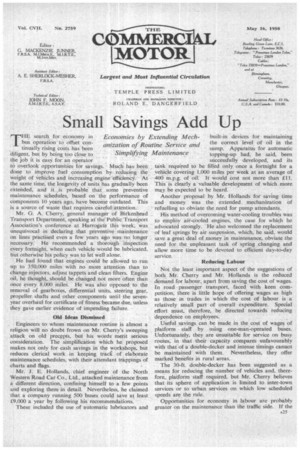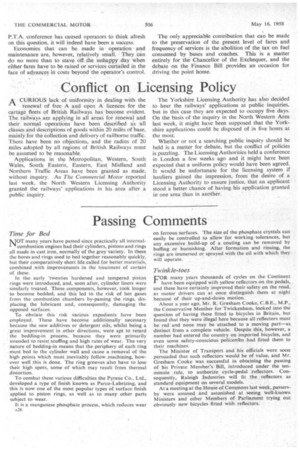Small Savings Add Up
Page 27

Page 28

If you've noticed an error in this article please click here to report it so we can fix it.
THE search for economy in bus operation to offset continually rising costs has been diligent, but by being too Close to the job it is easy for an operator to overlook opportunities for savings. Much has been done to improve fuel consumption by reducingthe weight of vehicles and increasing engine -efficiency. At the same time, the longevity of units has gradually been extended, and it is probable that: some preventive maintenance schedules, based on the performance of components 10 years ago, have become outdated. This is a source of waste that requires carefut attention: Mr. G. A. Cherry, general manager of Birkenhead Transport Department, speaking at the Public• Transport Association's conference at Harrogate this week; was unequivocal in declaring that preventive: maintenance on lines practised even a few years ago was nol longer necessary. He recommended a thorough inspection every fortnight, when each vehicle would be lubricated, but Otherwise his policy was to let well alone.
He had found that engines could be allowed to run up to 350,000 miles with no more attention than to change injectors, adjust tappets and clean filters. Engine oil, he thought, should be changed not more often than once every 8,000 miles, He was also opposed to the removal of gearboxes:, differential units, steering gear, propeller shafts and other components until the sevenyear overhaul for certificate of fitness became due, unless they gave earlier evidence of impending failure.
Old Ideas Dismissed . Engineers to whom Maintenance routine is almost a religion will no doubt frown on Mr, Cherry's sweeping attack on old precepts, but his words merit serious consideration. The simplification which he prOPosed makes not Only for cash savings in the workshops, but reduces clerical work in keeping track of elaborate maintenance schedules, with their attendant trappings of charts and flags.
Mr. I, E. Hollands, chief engineer of the North Western Road Car Co., Ltd., attacked maintenance from a different direction, confining himself to a few points and exploring them in detail. Nevertheless, he claimed that a company running 500 buses could save at least £9,000 a year by following his recommendations.
These included the use of automatic lubricators and • built-in devices for maintaining the correct level of oil in the sump. Apparatus for automatic topping-up had, he said, been successfully developed, and its tank required to be filled only once a fortnight for a vehicle covering 1.000 miles per _week at an average of 400 m.p.g. of oil. It would cost not more than Ell. This 'isclearly, a valuable development of which .more may, be expected to be heard.
Another proposal by Mr. Hollands for saving time and money was the extended mechanization of refuelling to obviate the need for pump attendants.
His method of overcoming water-cooling troubles was to employ air-cooled engines, the case for which he advocated strongly. He also welcomed the replacement of leaf springs by air suspension, which, he said, would save a great deal of money in maintenance, obviate the need forthe unpleasant task of spring changing and allow more time to be devoted to efficient day-to-day service.
Reducing Labour Not the least important aspect of the suggestions of both Mr. Cherry and Mr. Hollands is the reduced demand for labour, apart from saving the cost of wages. In road passenger transport, faced with keen competition, there is little hope of offering wages as high as those in trades in which the cost of labour is a relatively small part of overall expenditure. Special effort must, therefore, be directed towards reducing dependence on employees. .
. Useful sayings, canbe made in the cost of wages of platform . staff by using one-man-operated btises. Unfortunately, they are unsuitable for service on busy routes, in that their capacity compares unfavourably with that of a double-decker and intense timings cannot be maintained with them. Nevertheless, they offer marked benefits in rural areas.
• The 30-ft. double-decker has been suggested as a means for reducing the number of vehicles and, therefore,, platform staff required, but Mr. Cherry believes that its sphere of application is limited to inter-town services or to urban services on which low scheduled speeds are the rule.
Opportunities for economy in labour are probably greater on the maintenance than the traffic side, If the P.T.A. conference has caused operators to think afresh on this question, it will indeed have been a success.
Economies that can be made in operation and maintenance are, however, relatively small. They can do no more than to stave off the unhappy day when either fares have to be raised or services curtailed in the face of advances in costs beyond the operator's control. The only appreciable contribution that can be made to the preservation of the present level of fares and frequency of services is the abolition of the tax on fuel consumed by buses and coaches. This is a matter entirely for the Chancellor of the Exchequer, and the debate on the Finance Bill provides an occasion for driving the point home.




































































































